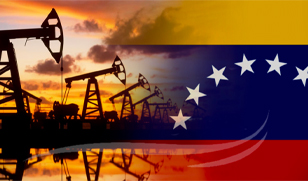 2022 / 19 / Jun
2022 / 19 / Jun
Venezuelan oil is an option (American - OrandB) as an alternative to Russian energy sources
Concrete facts
Abdul karim Jaber Shanjar Al Issa
Professor of International Relations and Financial Monetiology, University of Al-Qadisiyah / College of Administration and Economics
The United States of America is seriously seeking to find an alternative to Russian energy sources (crude oil and natural gas) that your and Ba need to meet the consumption of the productive and family sectors after the Russian invasion of Ukraine on February 24 of this year. The Russian invasion leads to the thaw between the United States of America and the West in general with Venezuela by virtue of the huge reserves of crude oil of Venezuela, and the first step in this direction came the meeting that brought together senior White House officials on March 15 of the same year mentioned in the government of Venezuelan President (Nicolás Madura) after a rupture that lasted a year and was concentrated The objectives of the meeting are in three points:
First: Identify the nature of military cooperation (Russian-Venezuelan)
Second: Discussing the possibility of oil becoming an alternative to Russian oil imported by Or,Ba and the United States of America in the event of acomprehensive embargo on Russian oil.
Third, a point that has nothing to do with Venezuela's resumption of oil exports to the United States, dealt with the release of American prisoners in Venezuela.
With the escalation of the momentum of the war in Ukraine, the trend of banning energy imports from the Russian Federation has taken a serious issue at the end of this year. Can the 27-member bloc do that? And what is the appropriate alternative?Hence, the return of US-Venezuelan relations is seen as one of the consequences of the war on Ukraine, and the consequent change in fossil energy trade trends, and the beginning of those changes in the removal of economic and financial sanctions imposed on Venezuela imposed on it in August 2017 by the United States of America when the Venezuelan president blocked the rewriting of the constitution and the dismantling of the legislative authority. At that time, former US President Donald Trump issued rapid economic and financial measures against the Venezuelan regime and the energy sector in particular, andaccording to the report of the Economic Commission for Latin America and the Caribbean, this resulted in a five-fold decrease in crude oil production and a decline in Venezuela's exports by (50%) after US sanctions, and this was followed by a decline in Its imports increased by (-10%) at a monthly rate in 2017 and then to -50%) in 2020 and the most impact on the Venezuelan citizen as the monthly wage rate fell to 3 US dollars.
We shed more light on this topic in two points:
No: Facts about the Venezuelan oil option
1- Oil was discovered in Venezuela in 1922 and Venezuela became the largest exporter of crude oil in 1928, and after the nationalization of oil in 1976, there was a transformation in the Venezuelan economy, like the other major oil countries in the world, as it neglected economic diversification and the extractive sector became up to (60%) of its gross domestic product, and oil revenues represent a percentage of up to about (96%) of the total financial revenues and imports food and medicine.Venezuela was one of the founders of OPEC at its founding meeting in Baghdad in September 1960.
2- Venezuela has huge reserves of crude oil with a volume of 304 billion barrels, representing (18%) of the world's global reserves of crude oil of 1733 billion barrels, and thus it ranks first in the world, then Saudi Arabia second (17%), Canada third (11%), fourth Iran (9%), and fifth Iraq (8%)).
3- The nature of Venezuelan oil is dominated by being heavy and thick oil (acid), and this feature reduces the importance of this type of oil in the world because it requires special operations when extracting, refining and transporting, and when comparing the price per barrel of Venezuelan oil, it amounted to about $ 62.72 for the month of October 2021, while the price of Iraqi and Saudi oil Light About 81.48 and 82.77 per barrel respectively.
4- Before the US sanctions, Venezuela produced about 2.24 million barrels per day in 2016, of which it exports 1.9 million barrels per day and consumes the rest, and revenues amounted to 22 billion dollars, and after the sanctions, production decreased to 540 barrels per day and by (-40%) in 2020.
Second: Diplomacy or Pragmatism in the US-Venezuelan Rapprochement:
1- The dominance of crude oil trade between the United States of America and Venezuela, and the volume of US imports of heavy crude oil before the imposition of sanctions in 2016 is about 741 thousand b/d and 55 thousand b/d of heavy petroleum products, while Venezuela imports about 75,000 b/d of petrochemical products from America.
2- The United States of America still relies on fossil fuels in primary energy generation by up to (80%) compared to (18%) of clean energy alternatives and (2%) of nuclear energy, and the situation is more difficult with regard to the European side (European Union)
3- In terms of geopolitics and energy security, the European Union countries import (30%) of crude oil and (15%) of oil products with a value of $ 80 billion for 2021, while the need for Russian gas for 2021 The figures indicate European imports for 2021 of natural gas by pipeline ) about 211.3 billion / m3, of which 167.7 billion / m3 from Russia and a rate of about ( 79%) The European imports of natural gas through tankers (LNG) represent imports in this way about 17.2 billion / m3 and B (15%), which means that the European Union depends on (57%) of its natural gas needs on the Russian Federation and that means much more than half. Thus, it is an issue that cannot be overcome through the imposition of sanctions and Russian energy control, as differences have emerged between the members of the European Union and B over the adoption of sanctions or not, for example (the position of Hungary and Slovakia), over the rapid cessation of Russian gas.
4- As for the close alternatives to the Russian exporter, which acquires (27%) of the world's reserves of natural gas amounting to about 140.3 trillion / m3, other options are offered to increase the share of European imports from them, whether from within the European Union such as Norway and the Netherlands or from outside the Union such as Qatar, Australia, Algeria, Canada, Nigeria and Kazakhstan, and certainly the costs of The liquefaction of natural gas to become denser than natural gas and less than the density of steel at atmospheric pressure until it is transported by tankers and unloaded its loads in special ports that are not available in some European countries such as Germany, is more expensive andwillreflect on the life of the European citizenandB who is already beginning to feel the high prices of energy sources.
5- The alternatives offered cannot provide additional increases in the short and medium term, partly because the main producers of natural gas have long-term contracts with countries consuming natural gas, and this applies to the State of Qatar, which ranks third in the volume of natural gas reserves with a volume of 24.7 trillion / m3 and by (21%) globally, while there are political problems with Iran We want to put it here, which has the second reserves of natural gas in the world with a volume of 32.1 trillion / m3 and a percentage of (23%) globally.
Summary
We conclude from all that has been proposed, it is difficult to change the trends of global trade in existing energy sources, even if advanced technology is used, the rules of geographical distribution of these sources cannot be changed, perhaps finding clean alternatives to this type of energy is the only way to break the equation , as well as even if diplomacy succeeds in restoring Relations between the United States and the West on the one hand and Venezuela on the other hand in oil relations in light of the escalation of the Russian-Ukrainian war (especially since the sanctions on Venezuela are not UN sanctions and the UN Security Council did not approve a resolution on them at the time, but rather on the part of the United States of America and close allies) may be a temporary part if we know that Venezuela exports (15%) of its oil to OrandBa before the US sanctions in 2017 While the Asian partner accounted for 72 percent of Venezuela's crude oil exports in the last year, the mother needs more U.S. diplomacy to deal again to restore the bilateral trade partnership in goods between the two countries, which before the sanctions was for Venezuela the first place with its other trading partners.

Abdul Karim Jaber Shanjar Al Issa